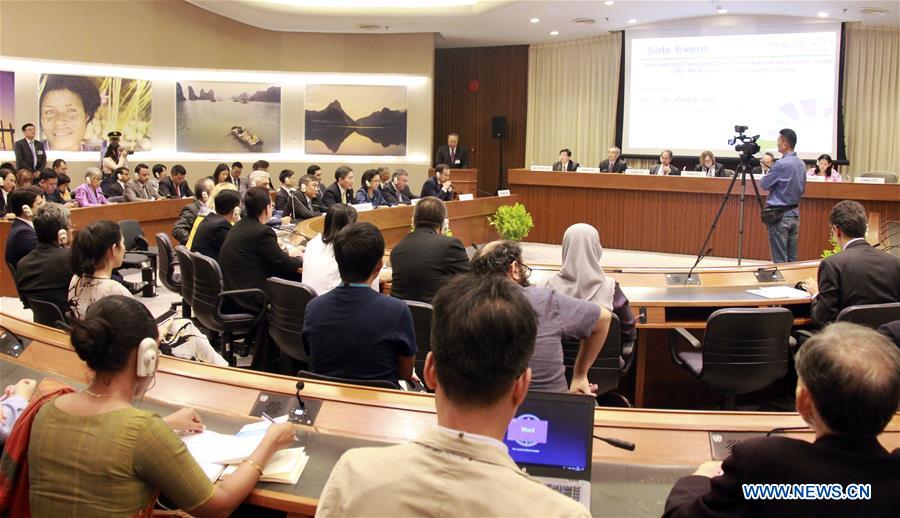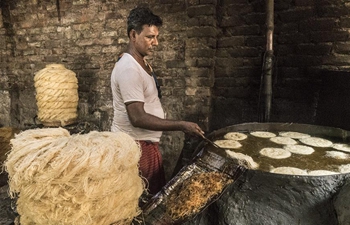
Photo taken on May 27, 2019 shows view of the 75th session of the United Nations Economic and Social Commission for Asia and the Pacific (ESCAP) in Bangkok, capital of Thailand. The ESCAP opened its 75th session in Bangkok on Monday, with global and regional leaders calling for greater empowerment and inclusion of marginalized groups to achieve the 2030 Agenda for Sustainable Development. (Xinhua/Yang Zhou)
BANGKOK, May 27 (Xinhua) -- The United Nations Economic and Social Commission for Asia and the Pacific (ESCAP) opened its 75th session in Bangkok on Monday, with global and regional leaders calling for greater empowerment and inclusion of marginalized groups to achieve the 2030 Agenda for Sustainable Development.
According to a press statement of UN ESCAP, officiating the session, Thai Princess Maha Chakri Sirindhorn emphasized the importance of a people-centered approach to sustainable development.
"People who live in underdeveloped areas also deserve to be happier and live better," the princess said.
In her policy statement, UN Under-Secretary-General and Executive Secretary of ESCAP Ms. Armida Alisjahbana shared how empowered societies can respond to challenges which transcend borders and accelerate progress towards the 17 Sustainable Development Goals (SDGs).
She said: "We can learn from each other as we strengthen policies, institutions and legislation to empower people and promote equality. This effort should be complemented by work to strengthen regional cooperation on population development and social protection - but also to promote gender equality, disability rights and safe, orderly and regular migration."
"In recent decades, quality of life has improved for most people in the region. Yet, growing inequalities present a threat to further advances. The challenge is to ensure that socio-economic progress reaches those left behind," said UN Secretary-General Mr. Antonio Guterres in a video message. "We must also do far more to combat climate change in the region. This is a battle we can and must win."
"Cambodia's experiences have made clear that peace and stability are indispensable foundations for development, and in turn an inclusive and equitable development are necessary conditions for strengthening peace and social stability," said Cambodian Prime Minister Samdech Techo Hun Sen, while highlighting the county's national policies on social protection, health equity funding and supporting ageing to ensure no one is left behind.
Foreign Minister of Mongolia Damdin Tsogtbaatar, who was elected as the Chair of the 75th Session, underscored the important notion of the SDGs - to leave no one behind.
"This session gives us opportunity to accelerate the pace of implementation, shape policies and integrate national strategies to reduce the gap between rich and poor and threats from climate change."
The 75th session of the Commission is being held under the theme "Empowering people and ensuring inclusiveness and equality."
A flagship report Closing the Gap launched to coincide with the annual meeting assesses whether disadvantaged groups such as rural populations, persons with disabilities and women have been effectively included in development.
Also on Monday, ESCAP also signed four Memoranda of Understanding (MoU) with the UN Office for Disaster Risk Reduction, International Solar Alliance, Association of Pacific Rim Universities and Multi-GNSS Asia to increase regional cooperation in the areas of disaster resilience, early warning systems, renewable energy, research and evidence-based policy making.















